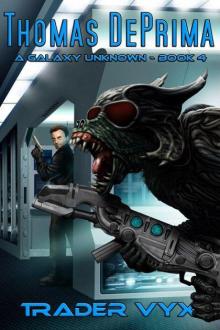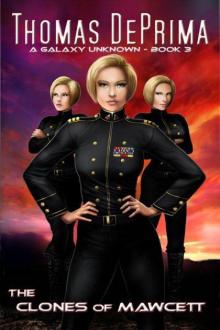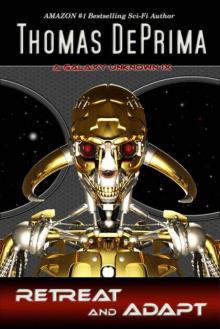- Home
- DePrima, Thomas
Citizen X - BP01 Page 17
Citizen X - BP01 Read online
Page 17
By morning, the camp had been reduced to just the CP tent and equipment, and personal equipment and effects. All other traces of their short habitation had been erased through camouflage techniques. Just before they left on the raid, the CP tent would be struck and packed for transport. For now, Kennedy wanted someone manning the com gear in case a message came from the Perry.
Marines were asleep in every conceivable location where they wouldn't get stepped on or tripped over. Since everyone had to sleep in their armor, it would have been a waste of time to create any sort of bed from the bushes around them. Sydnee needed rest also, but she first walked to the clearing to take one last look into the sinkhole. The MAT was completely covered and there was no indication of what, if anything, was buried beneath the dirt that continued to fall from the sidewalls as the crater expanded. It seemed as if the depression had gotten deeper, but Sydnee hadn't taken measurements when it occurred so it was just conjecture. She hoped the small ship would still be accessible when they were able to attempt retrieval.
* * *
Sydnee awoke in darkness. She heard commotion all around her and at first was fearful, but then she realized that she had turned off the display inside her helmet in order to fall asleep in the morning hours because sunlight was filtering through the overhead canopy of tree branches and leaves. Even after activating the display, it was dark, but not so dark that she couldn't make out the shapes of Marines around her as they completed their final packing in preparation for the long trek ahead. She adjusted the helmet for optimal vision and everything suddenly illuminated. A faint red glow in the HUD reminded her that the image she was seeing was an enhanced composite view from the helmet cam and sensors.
On Earth, a five-kilometer hike, or even run, could be enjoyable when done in shorts on a decent day, but the journey ahead of them wasn't going to be pleasant at all. The new armor was lightweight compared to the old, but it was still dead weight. When weapons and other essential gear were factored in, each Marine would be carrying roughly fifty extra pounds. It would have been much worse if not for the four oh-gee sleds they'd used to ferry gear to the camp from the MAT. They had been invaluable in transporting the heavier loads for concealment in the ravine and were now being packed with food, com equipment, medical necessities, and other supplies in case they couldn't return to this location. The one-meter-wide by two-point-five-meter-long sleds could be adjusted to float up to a meter and a half above the surface with loads as great as a metric ton.
The sleds were being loaded with the heaviest cargo to minimize the weight the Marines would have to carry rather than the bulkiest items, so a couple of Marines would work in tandem to transport lighter but more cumbersome loads such as the CP tent poles. The Marines had tested inflatable tents in an effort to eliminate the poles and make for easier setup, but they hadn't held up well under combat conditions. No fabric was ever lattice round and laser proof, so one errant shot was all it took to collapse the tent on the occupants. Self-sealing membrane didn't work effectively, so the Space Marines still carried poles for the large flexible-material tents. The poles were the lightweight, expandable type though. Each team member carried a thermal blanket outside their pack, sealed in a watertight package. The blanket wasn't much thicker than a workman's drop cloth and was so light that the weight added almost nothing to the load.
The packing was complete and the platoon was almost ready to move out when Kennedy got a message from one of the forward scouts watching the rebel camp using the surveillance vid units. Kennedy immediately gave the order to strike the CP tent and the platoon was on the move within fifteen minutes.
As they stepped into the jungle, everyone heard Kennedy say, "All external speakers should be off. Group chatter is restricted to Com 1. Com 2 is for communications between myself, the noncoms, and our scouts. Understood?"
A chorus of voices could be heard saying, "Oo-rah." Just as with Sydnee's private communication with Kennedy, any member of the platoon could communicate privately with any other, or any small group such as a fire team, and many would discuss personal observations as they traveled.
Unlike most of the platoon members who had either been out on recon or on patrol in the area around the camp, this was Sydnee's first venture into the jungle. She thought she was prepared for the trek, but it was unlike anything she had ever experienced before. Travel through the wooded areas wasn't too difficult, and climbing up steep slopes using ropes strung by the lead scouts was challenging, but walking through swamps where they were completely submerged at times was more than she had expected. The armor was sealed and each person remained perfectly dry, but she found it very disconcerting the first time the person ahead of her disappeared below the water line and she realized there was no one else visible ahead of her at that moment.
As Sydnee slipped below water level, she experienced a moment of panic in the dark, murky water, but then an outline of the person ahead of her appeared on the inner faceplate of her helmet. She kept following that outline until she was rising out of the muck and she saw that the platoon members ahead of her were all visible again.
"If I wanted jungle warfare I would have joined the Marines," she grumbled aloud to herself as they stepped out onto somewhat dryer land again.
"Stow it, Marcola," she heard Kennedy's voice say and only then realized that her direct com link was open. "Until the Perry returns, you are a Marine."
Sydnee silently cursed herself for not noticing that the Com 2 transmit link was open and for opening her big mouth. Then she smiled at her mistake.
By the time the platoon reached the point where the teams would split off and head for their designated target, the forward scouts were reporting that the nine rebel sentries had stopped patrolling and found comfortable places to lie down. Most of them appeared to be asleep. The scouts gave each team leader the location of the sentries in his target area, and the team leader confirmed the assignments to his squads. Having all communications contained within the sealed helmets meant that no sentries could ever hear voices where no one should be.
On a signal from Kennedy, the teams activated the invisibility feature of their armor and moved to their forward attack position to await the signal to proceed. The invisibility feature of the armor didn't conceal Marines from their comrades. The suits appeared as a solid mass to the helmet sensors of other Marines.
Kennedy didn't waste any time once the three teams were in place. Silently, the teams moved into the darkened clearings and neutralized the sentries. Most never awoke from their slumber until they were struggling to take their last breaths. The element of surprise had always been the most powerful weapon in a military organization's bag of tactics. The sentries were so sure that no one was going to attack the camp that they had totally relaxed their guard. It was a fatal mistake.
With little chance of discovery, the Marines could take their time planting the Corplastizine charges on the designated stockpiles. When the powerful charges were ignited, there would be little left of the materials in the clearing. The rebels might not even be able to find enough of the sentries to understand that they had been attacked by an outside force, but that would be the only explanation for the stockpiles in all three clearings being destroyed simultaneously by explosions.
Since no alarm had yet been raised at the rebel camp, Kennedy waited until all teams arrived at the rendezvous point before he triggered the Corplastizine. As the night seemed to turn into day briefly and the ground shook violently, the platoon knew that the stockpiled ordnance was just a memory. What remained would only be so much useless trash.
The platoon withdrew quickly along their planned route. They didn't leave any more nosily than necessary, but their departure certainly wasn't as stealthy as their approach had been. Nor did it need to be. Small secondary explosions were still reverberating off the trees around them as they melted into the jungle.
From their original base camp, the rebel encampment area had been almost due north according to the planet's ma
gnetic poles, so Kennedy chose east for their withdrawal. If the rebels were able to track them, the cached supplies should remain secure for future access. The oh-gee sleds made a tremendous difference. In swampy areas, they glided above the surface pulled by a tow rope while the Marines waded in and walked along the bottom. The low weight of the armor, combined with a certain amount of buoyancy from air trapped inside, made travel in the water less difficult than it would have been otherwise, but occasionally they encountered mucky areas that offered no footing and so had to be circumvented.
At one point, Sydnee heard someone say on Com 1, "Oh shit, I've picked up a hitchhiker. I don't know if it's trying to eat me or make love to me. Can someone help?"
Sydnee managed to locate the speaker, who was just emerging from a submerged walk through the swamp. There was an enormous creature atop his helmet that looked like a cross between an octopus and a squid. Long tendrils were draped around the Marine's helmet and upper torso.
The Marine behind him placed her laser rifle almost against the creature's main body sitting atop his helmet and fired once, careful not to hit the Marine or anyone else. The creature slumped and began sliding off as the gripping tendrils lost their power to remain in place.
The Marine grabbed it before it hit the ground. "Anyone know what this thing is?" he asked.
"I think it's called a Grepper," Sydnee said. "Or at least it's a member of that family. Supposed to be good eating, if you like squid," she said with a grimace that no one could see.
The Marine stuffed it into a large, empty plastic sack that he pulled out of his backpack. "I like my calamari cooked in seasoned tomato sauce," he said. "We'll check it out later."
In four hours, the platoon managed to cover only four kilometers of jungle owing to the fact that it was all swamp. The way in had been planned for the easiest going, so it had been mostly dry, wooded land and small ridgelines easily scaled. Sydnee supposed Kennedy hadn't told the scouts to plot an escape route.
The platoon was just exiting a swamp area when a scout detected aircraft approaching.
"Everyone pull their thermal blanket over their heads and keep still," Kennedy ordered.
In seconds, the platoon was sitting or squatting, motionless, as three shuttles appeared overhead just above treetop height.
Chapter Fifteen
~ Feb. 27th, 2285 ~
The three shuttles, each floating on a silent cushion of oh-gee waves, slipped through the sky above the canopy of green provided by the trees. They passed the platoon slowly, then stopped for a few seconds before returning to hover directly above the Marines.
Suddenly, a hatch opened on each shuttle and someone threw out smoke grenades that landed around the Marine perimeter.
"Everybody up," Kennedy yelled, "and move out. On the double."
Within a second, everyone was on their feet and trying to put as much distance as they could between themselves and their former location as fast as they could. The shuttles disappeared as two fighters took command of the sky overhead.
Using the smoke as their target, the fighters fired missiles into the area. The Marines, clear of the former area by just a narrow margin, dropped to the ground and hoped the fighter pilots were well trained, or at least accurate.
The attack didn't last long and ended when the fighters were out of rockets. Whether the pilots were good or only just lucky, the platoon was the winner when no one was hurt. As the aerial fighters left the area, Kennedy yelled, "Everybody up and moving, now. They might decide to come back."
The dark, acrid smoke from the explosions hung in the humid air like a morning mist, blotting out what little sunlight managed to pierce the treetops, but the helmet sensors enabled the Marines to run without fear of crashing into an obstruction or falling into a ditch. They were exhausted from their night's activities, but the attack gave them new strength. They were at least two kilometers away when the scouts reported that aircraft were approaching.
The shuttles didn't seem to be hunting this time. They just came straight in and hovered above the treetops. The growth was too thick to allow them to land, so when the hatches opened this time, instead of smoke grenades being tossed, it was ropes, which enemy combatants then used to lower themselves to the ground.
"It's going to take them awhile to pick up our trail in all that smoke, so let's cover some ground," Kennedy said, as he stepped into a swamp and was almost instantly up to his waist in filthy water.
"Marcola?" Sydnee heard coming in over Com 2. She recognized the voice as belonging to Kennedy. "Marcola," she replied.
"How did they find us? We were hidden under thermal blankets. They shouldn't have been able to spot our heat signatures from the air. What kind of thermal imagers do they have in those military shuttles?"
"I don't know what the Clidepp military has, but I imagine it's just standard equipment. The reason might be that thermal blankets were used. It doesn't get cold here overnight, so the surrounding vegetation stays warm. The instruction wafer that came with my armor said that the personal body armor blocks all thermal readings produced by a warm body while the exterior skin mimics the temperature of the surroundings. Perhaps they saw forty-two cold spots where they expected to see none. It might not have been body heat readings but the absence of all heat that tipped them off."
"Why didn't you call that to my attention earlier?"
"I assumed you read the instructions that came with your new armor and were prepared for thermal scanning from the air."
"You knew what I intended to use the thermal blankets for."
"I suspected what you intended, but you didn't share your plan. I assumed that you had read the armor instructions and that my assumption was wrong."
"Kennedy out," he said brusquely.
"Marcola out."
On Com 1, Sydnee heard Kennedy say, "If we detect shuttles overhead again, do not cover yourself with the thermal blankets. Let the armor handle the cloaking. Kennedy out."
The platoon had covered another two kilometers when a scout watching the rear reported that the rebels had left the drop zone and were following their trail. It seemed impossible that the Marines could pick up the pace, but they did, in spite of the fact that the going seemed to have gotten more difficult.
Slogging through a swamp was never fun, but knowing that someone was trying to catch up so they could kill you provided a lot of incentive to hurry. Although Kennedy had originally opted for maximum distance from the target over an unobtrusive retreat, he ordered the lead scouts to blaze a path where they would leave the least evidence of having passed. On Diabolisto, that meant slogging through every watery morass near their intended path. They also changed directions several times, although every step took them further from the rebel encampment.
* * *
"Reports from the Perry are overdue, sir," Commander Plummer reported to Captain Brookings, the base commander at Simmons Space Command Base, "and we're not receiving responses to our outgoing messages.
"When was their last report?" Brookings asked.
"On the 18th, sir."
"Nine days, eh. Is there any suggestion that this might be related to the diplomatic ship encounter?"
"None, sir. The Perry had assisted the diplomatic yacht in making its repairs and had then gone in search of the destroyer that attacked it. In his last message, Captain Lidden reported locating the ship in orbit around Diabolisto. It wasn't responding to challenges and appeared to be derelict. Lidden reported that there was obvious damage to the destroyer's forward larboard hull, but the Sub-Light engines and the FTL drive appeared to be undamaged. He was sending Marines over to investigate. That was the last report we received."
"It would seem that the ship wasn't a derelict after all." Brookings snorted. "Lidden's an excellent officer— too good to be stuck aboard a ship like the Perry. I know he wouldn't have moved in closer than twenty-five thousand kilometers until he knew the destroyer was in fact derelict, or at least impotent, but the destroyer could have suddenl
y come to life and engaged the Perry."
"The Clidepp reported that two destroyers were stolen from their shipyard, sir. It's possible that the second destroyer showed up while the Perry was engaged with the first."
"Yes. The Perry is only a light destroyer, and an old one at that. Two modern destroyers might have been too much for them. That damned old bucket should have gone to the scrap yard decades ago. It's barely been adequate for interdiction work. It's not up to fighting even one modern military warship, let alone two."
"If they really wanted to keep it in service, they should have assigned it duty such as guarding the entrance to the Mars shipbuilding yards or something. It doesn't belong anywhere where it might have to fight."
"We'll have to send someone to investigate. Who do we have available in that sub-sector?"
"No one."
"No one?"
"The Perry was the only SC warship in his sub-sector and, in fact, his entire sector because he was operating just a few days' distance from the border. If this was solely a search and rescue mission, we have a number of ships we could send, although it would take them months to arrive. But since there's a possibility of encounters with enemy warships operating in GA space, we can't send unarmed or lightly armed vessels. As for warships, we have the two light destroyers that are presently serving as a protection force for this base and seven others that are out on patrol. The warship closest to the Perry is the light destroyer Pellew. He could reach Diabolisto in about ninety-six days at top speed."

 Trader Vyx
Trader Vyx Valor At Vauzlee
Valor At Vauzlee The Clones of Mawcett
The Clones of Mawcett Retreat And Adapt (A Galaxy Unknown)
Retreat And Adapt (A Galaxy Unknown) Against All Odds
Against All Odds Citizen X - BP01
Citizen X - BP01